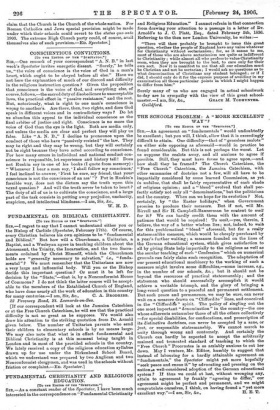THE SCHOOLS PROBLEM: A "MORE -EXCELLENT WAY"?
rTo THE EDITOR OP THE "SPECTATOR"] SIR,—An agreement on " fundamentals " would undoubtedly be excellent ; but you will, I think, allow that it is exceedingly difficult to attain. One difficulty—that of "graceless zealots" on either side opposing as aforesaid—would in practice be found considerable. But this is not perhaps the worst. Let us suppose the zealots away, and all anxious to agree if possible. Still, they must have terms to agree upon,—and how shall they be framed ? The Church Catechism, the "Free Church" Catechism, the Jamaica Catechism, with other summaries of doctrine not a few, will all have to be impartially considered by some learned Commission, as yet in nubi bus, that shall be fairly representative of each shade of religious opinion ; and a " blend " evolved that shall per- fectly satisfy not only all "denominations," but the politicians and the country. When can we hope for its evolution? Not, certainly, by "the Easter holidays," when Government promise to produce their measure. But if not, will Mr. Birrell and Sir H. Campbell-Bannerman be content to wait for it ? We can hardly credit them with the amount of patience that would be required! To wait,—yes, therein, I believe, the way of a better wisdom lies ; not, indeed, to waib for this problematical " blend " aforesaid, but for a really statesmanlike measure, which would be cheaply purchasad by a year's further waiting ; a measure founded on the lines of the German educational system, vthich gives satisfaction to all by giving State help impartially to the religious as well as the secular teaching of each " Confession " which on numerical grounds can fairly claim such recognition. The adaptation of our present educational machinery to the working of such a measure might involve some difficulties,—some increase, e.g., in the number of our schools, &c. ; but it should not be beyond the resources of practical statesmanship ; and the statesman who should successfully accomplish it would achieve a veritable triumph, and the glory of bringing a long-vexed question to a peaceful and permanent settlement. But such peace and permanence, we may be sure, can never wait on a measure drawn on " Cliffordite " lines, and conceived in the " Cliffordiee " spirit. The policy of singling out the one most important " denomination " in the country—the one whose adherents outnumber those of all the others collectively —for special disabilities, for confiscations, and proscription of its distinctive doctrines, can never be accepted by a sane, or just, or responsible statesmanship. We cannot march to unity through wrong and contumely. And certainly the Church can hardly be expected to accept the arbitrarily maimed and truncated standard of teaching to which the "Free Church" Procrustes is so amiably anxious to cut her down. May I venture, Mr. Editor, humbly to suggest that instead of labouring for a hardly attainable agreement on "fundamentals," the Spectator might yet more hopefully "seek peace and ensue it" by advocating and pressing on the national. well-considered adoption of the German educational system ? If thus we could at last, without wronging any, attain to agreement by frankly "agreeing to differ," our agreement might be perfect and permanent, and we might congratulate ourselves, I think, on having found a "yet more
excellent way."—I am, Sir, &c., H. E. T.










































 Previous page
Previous page